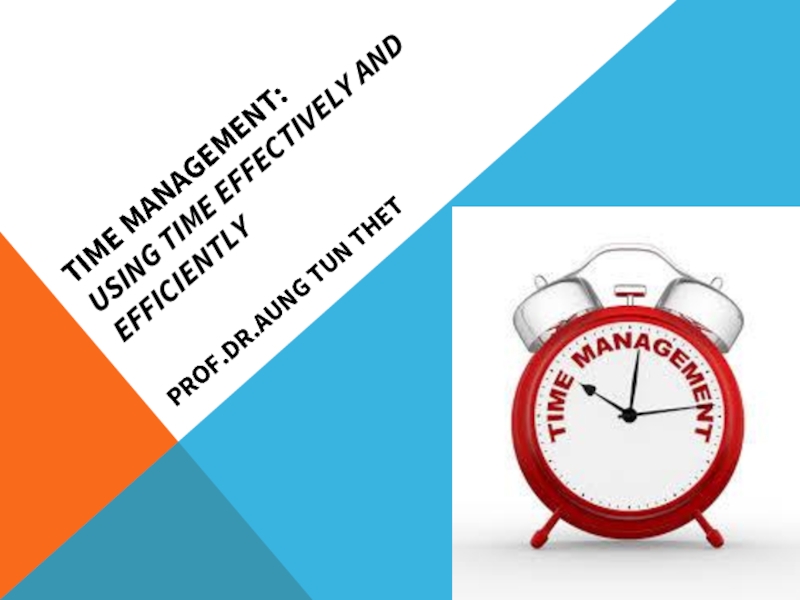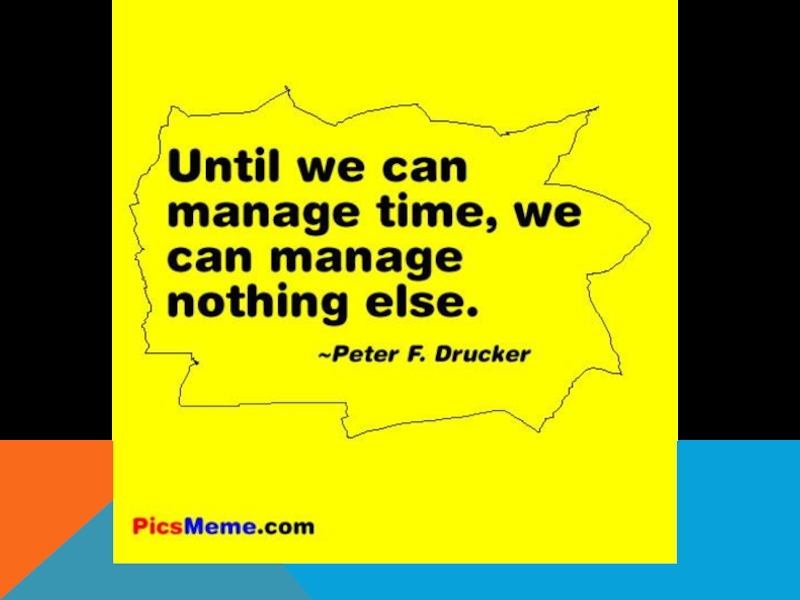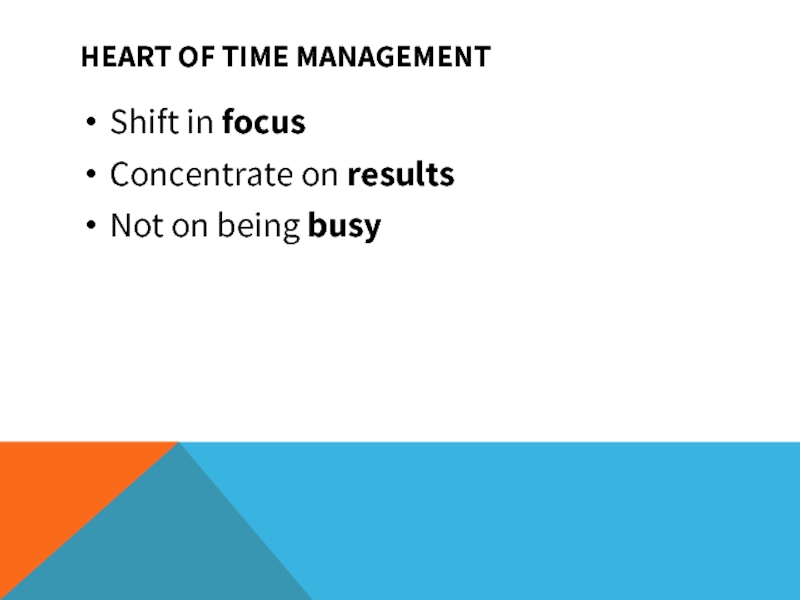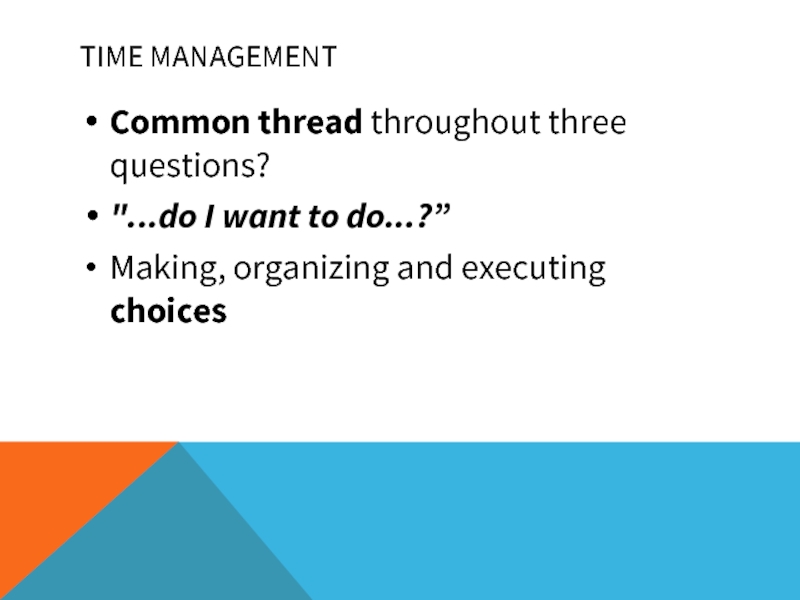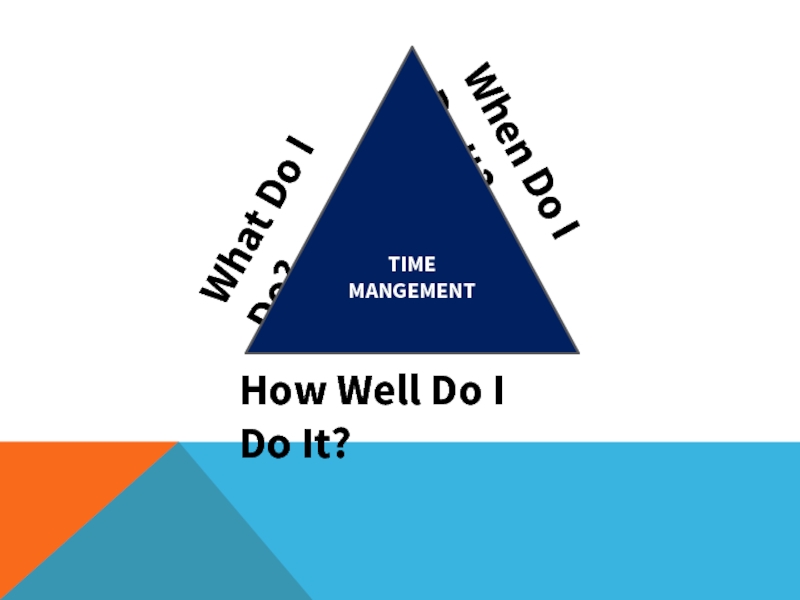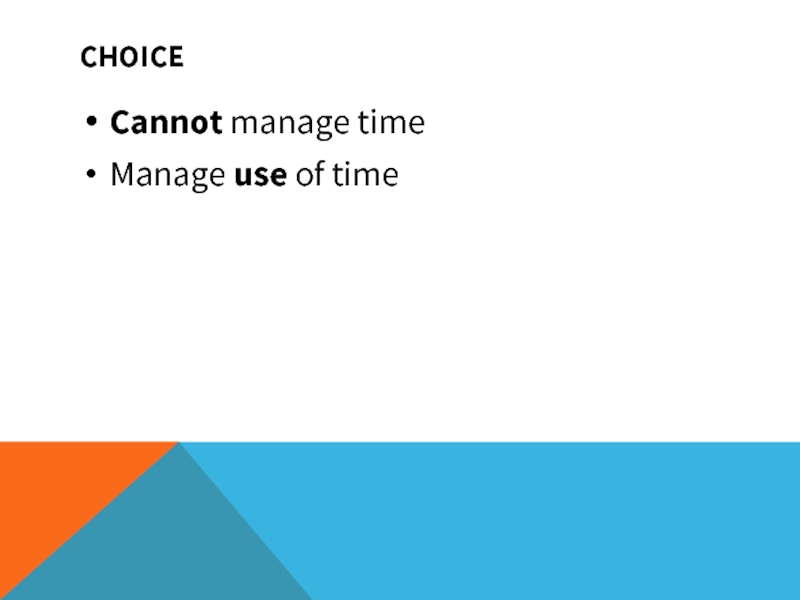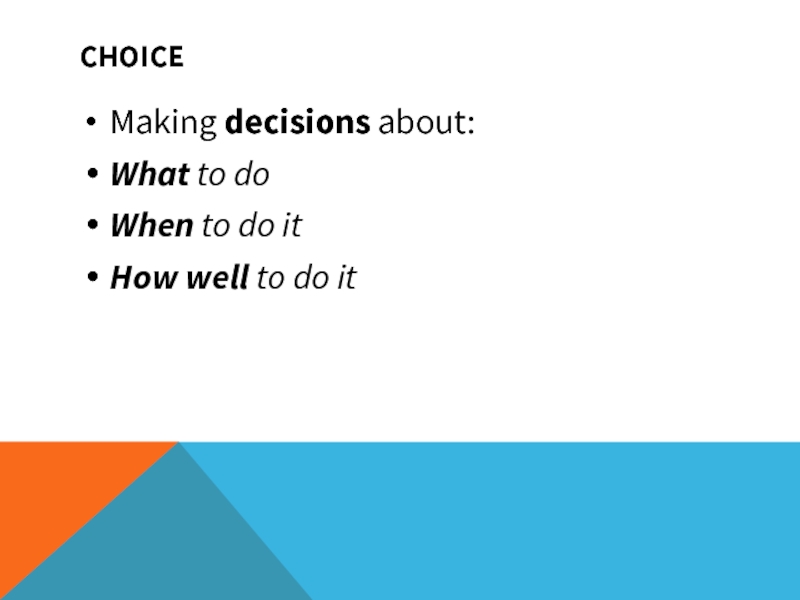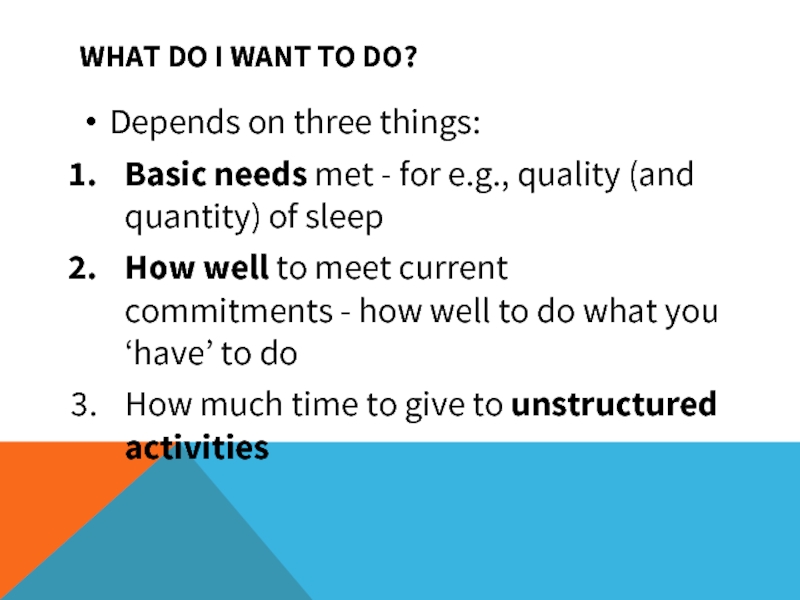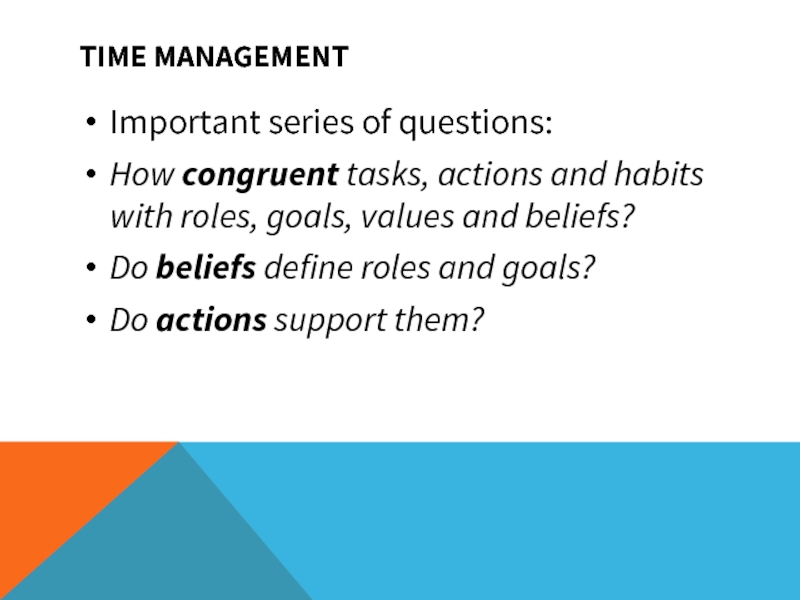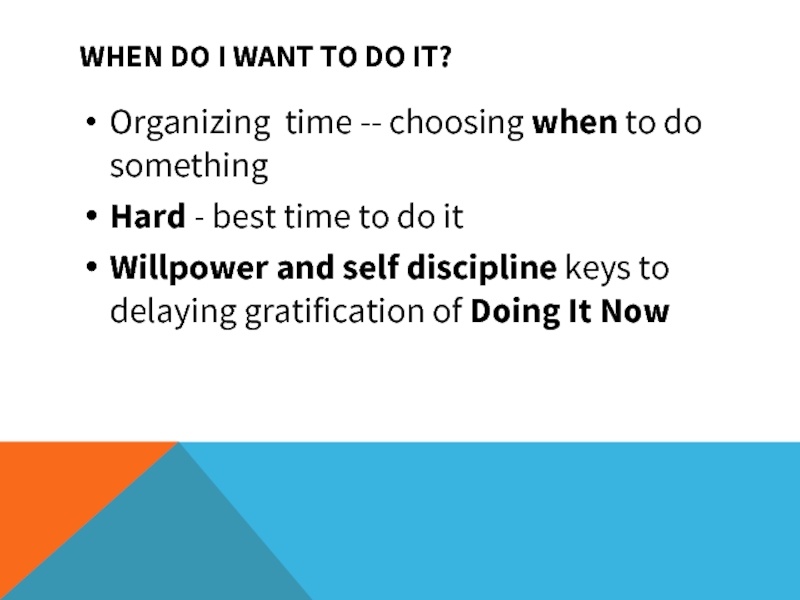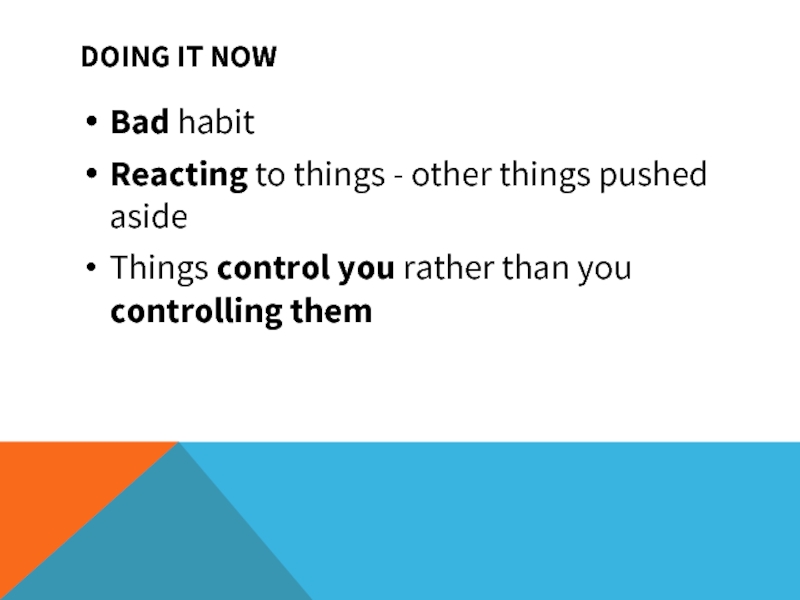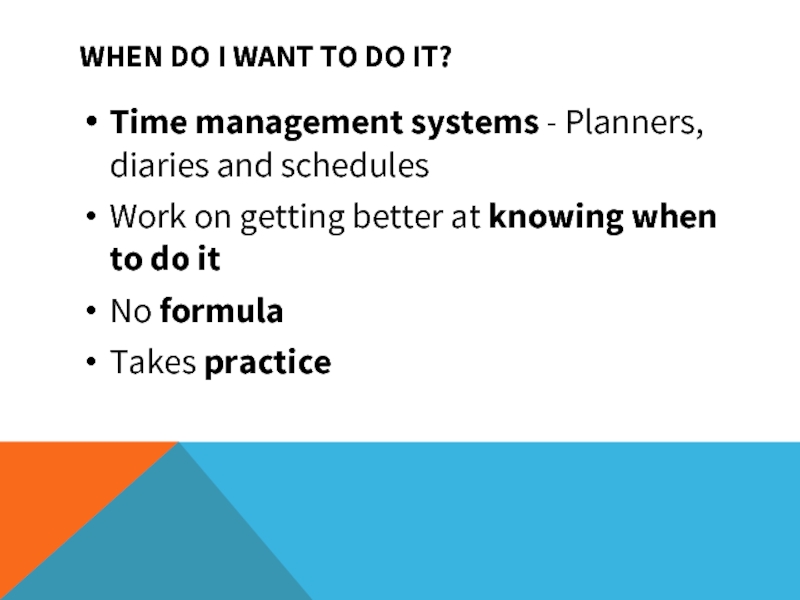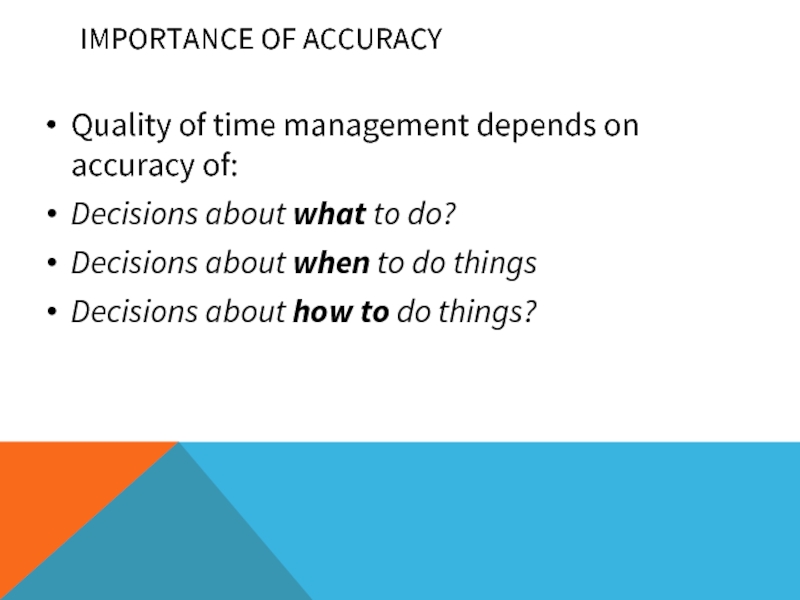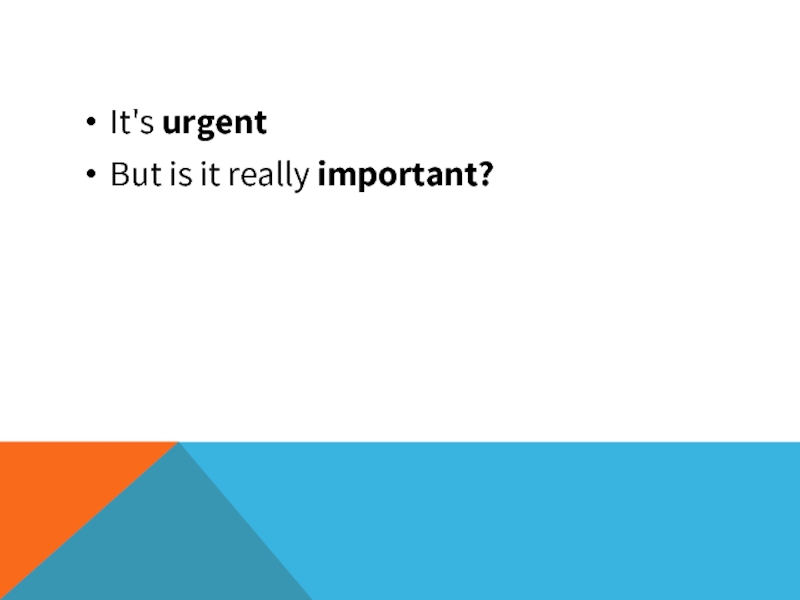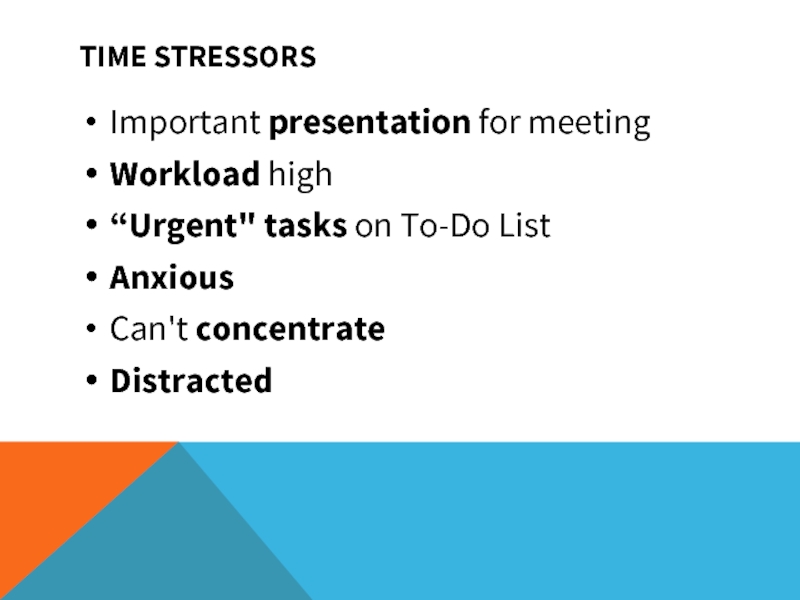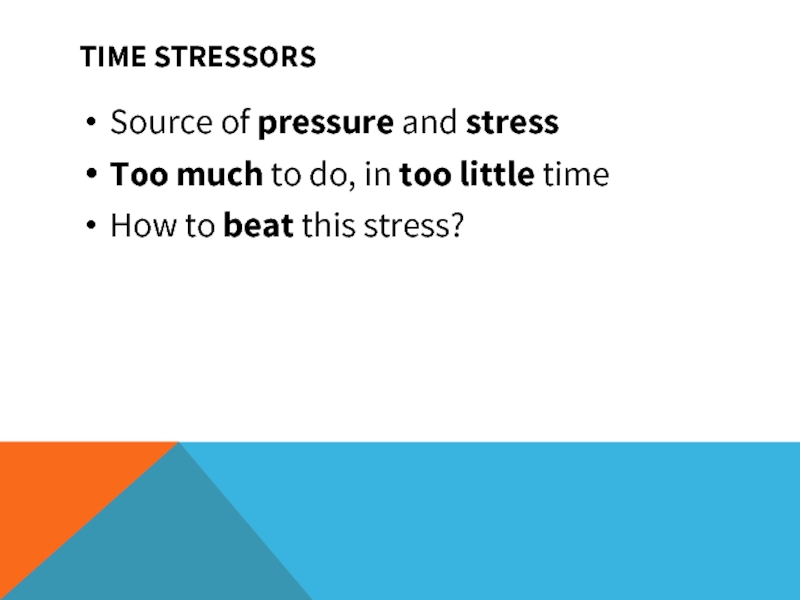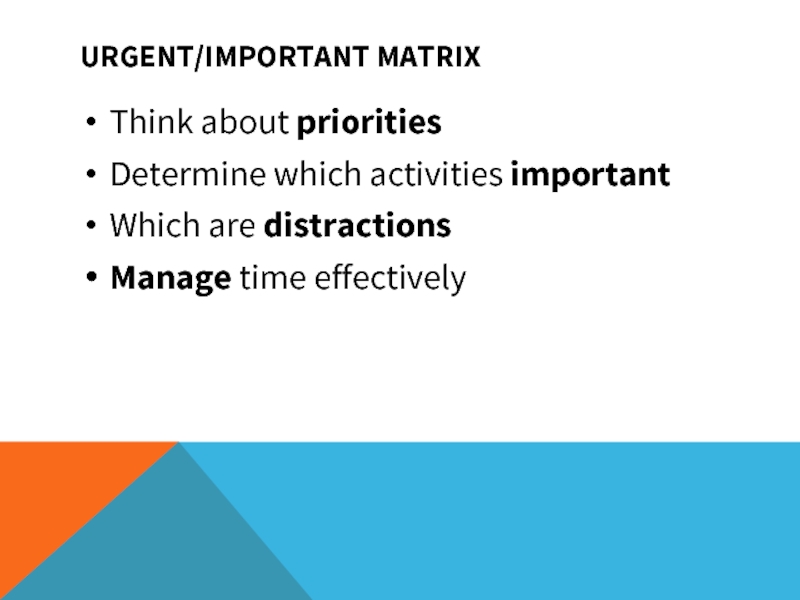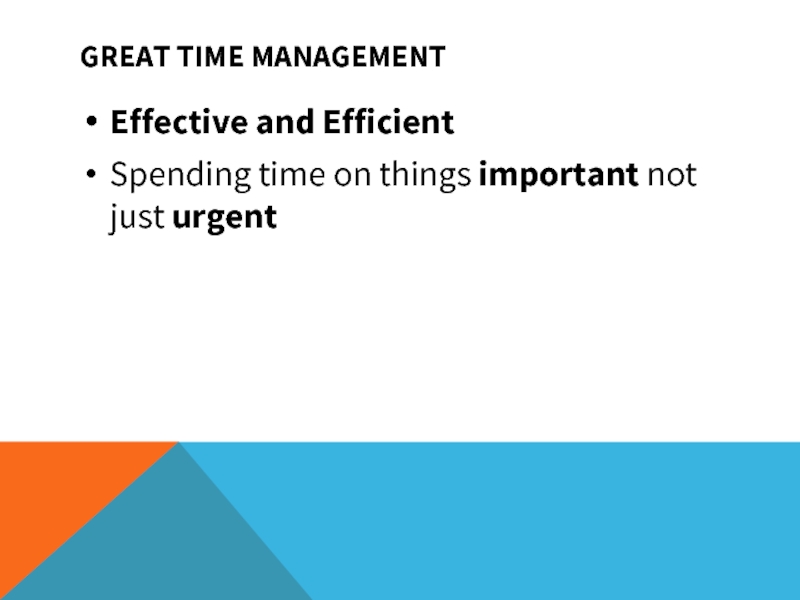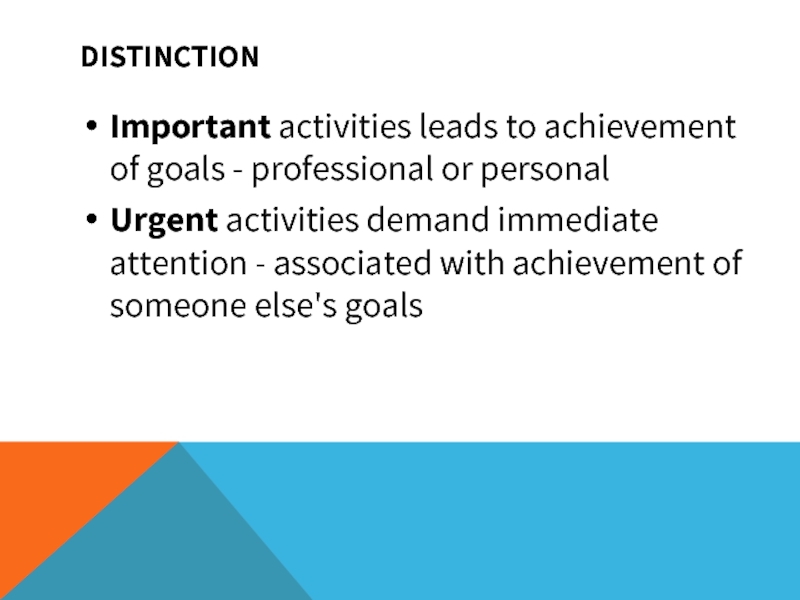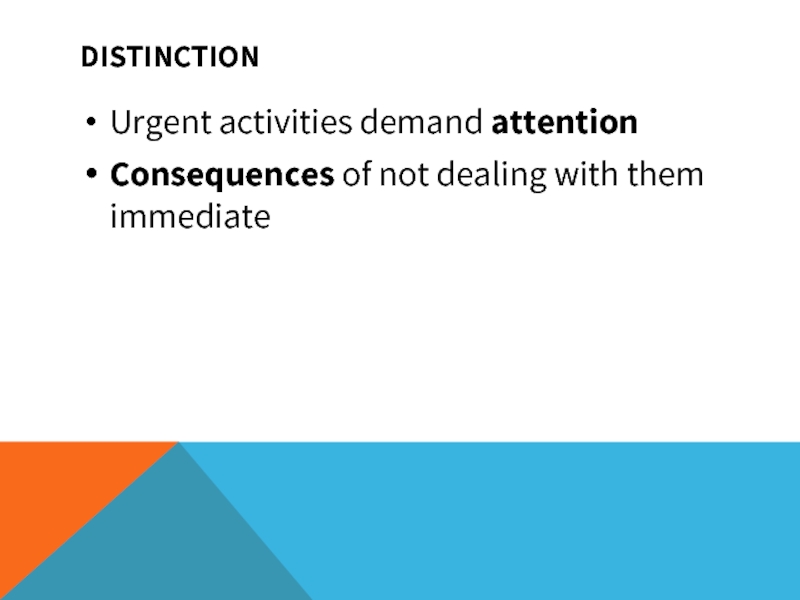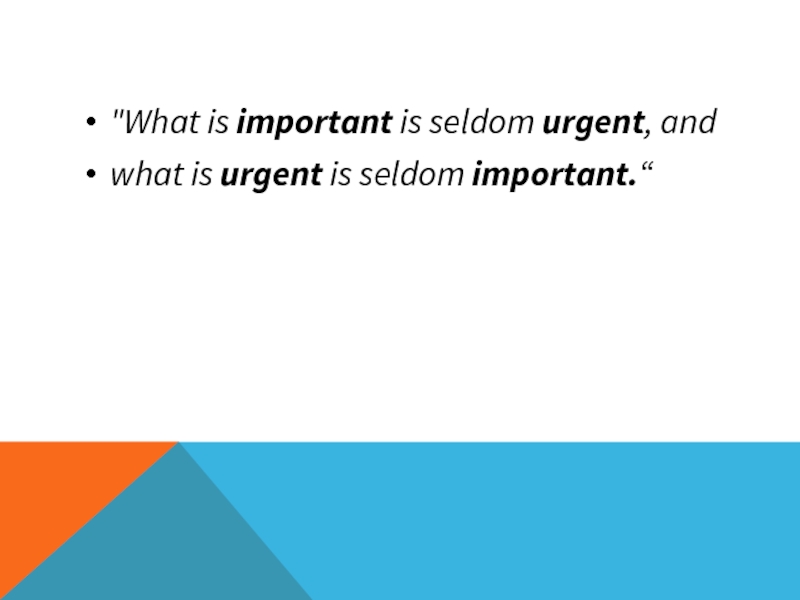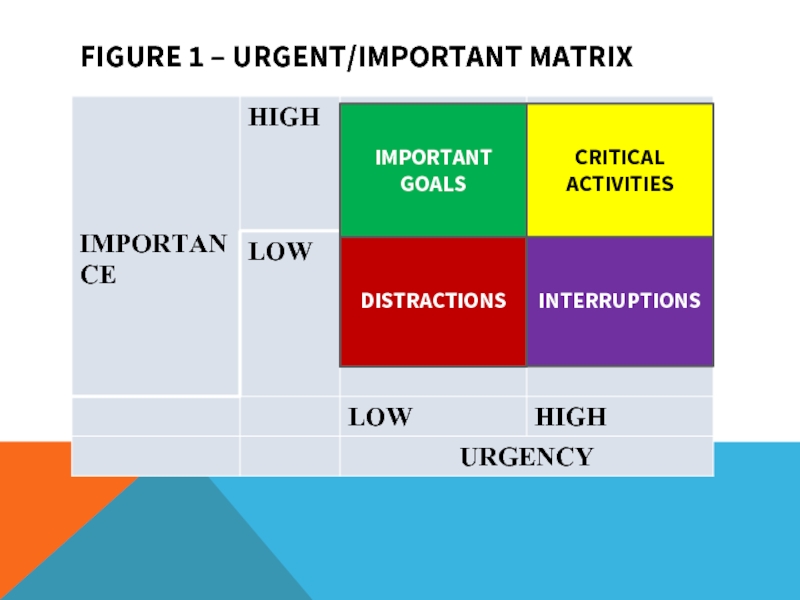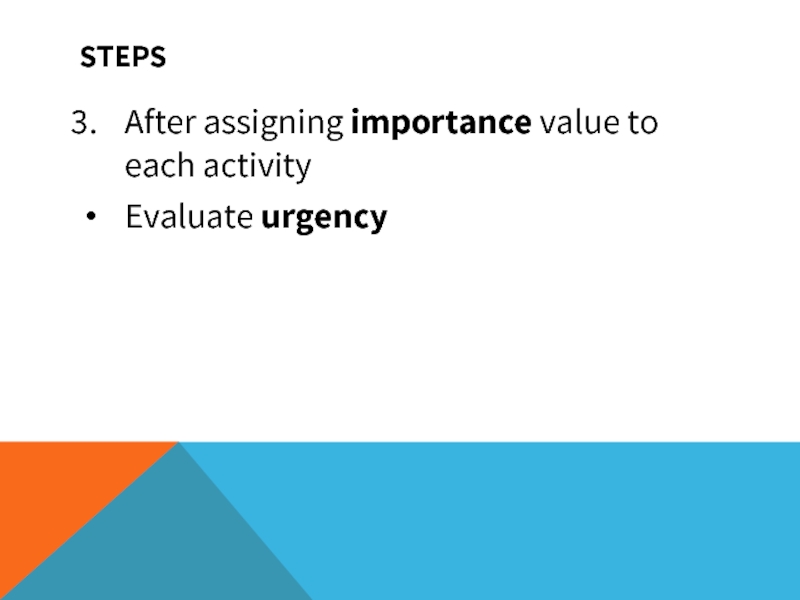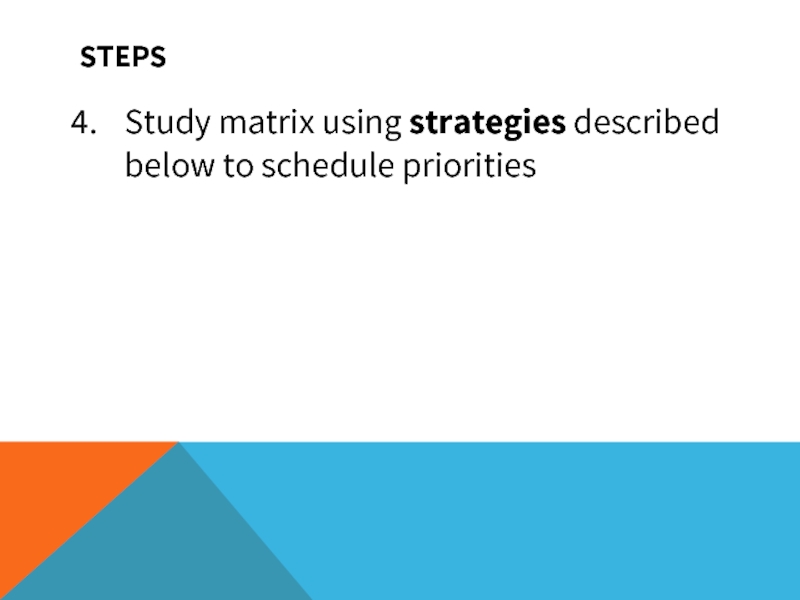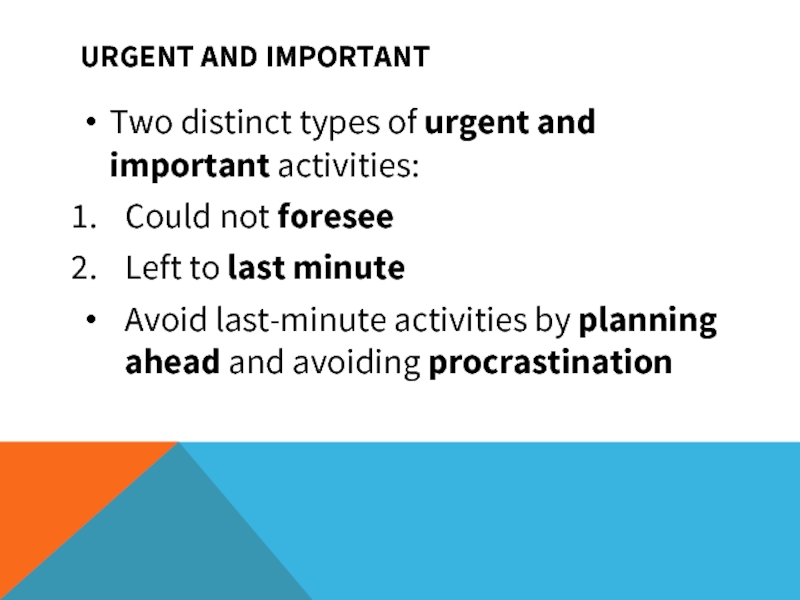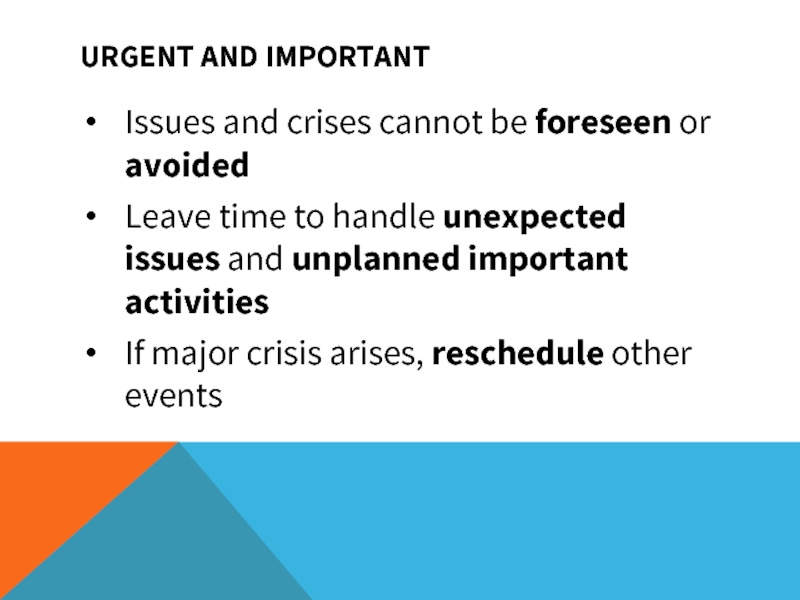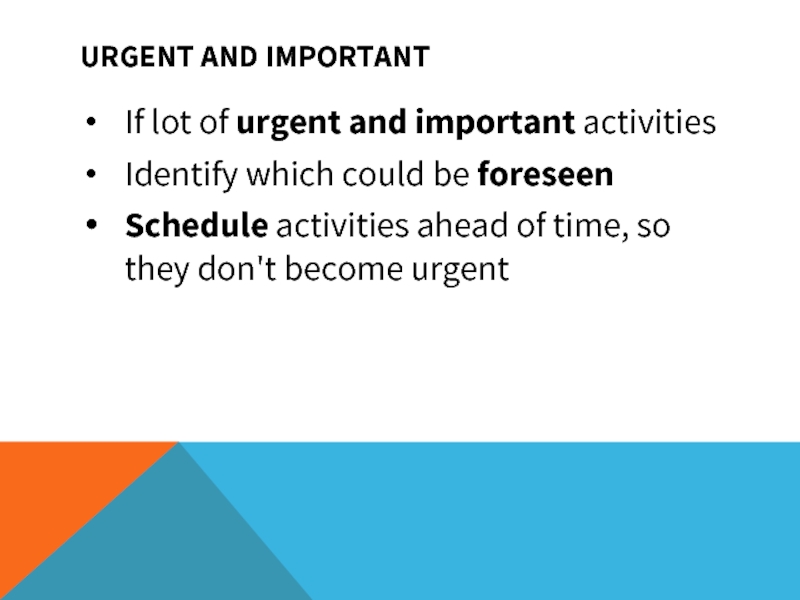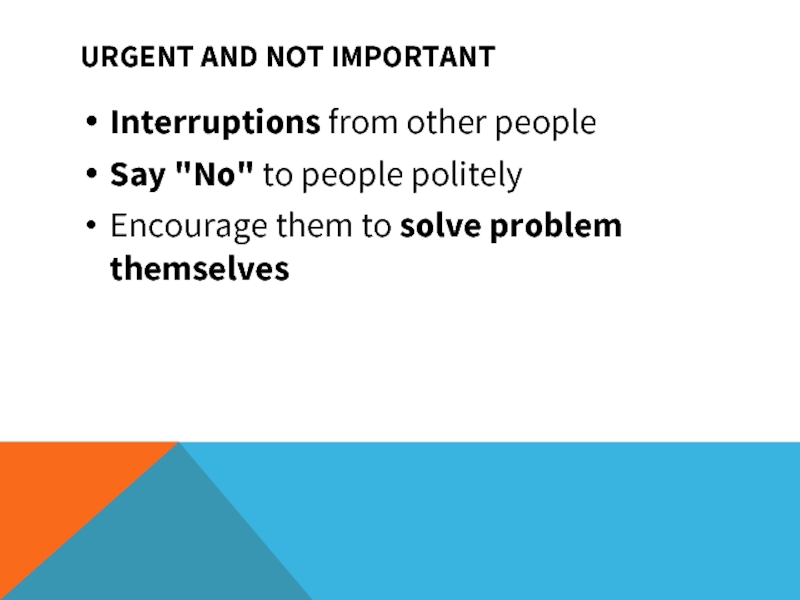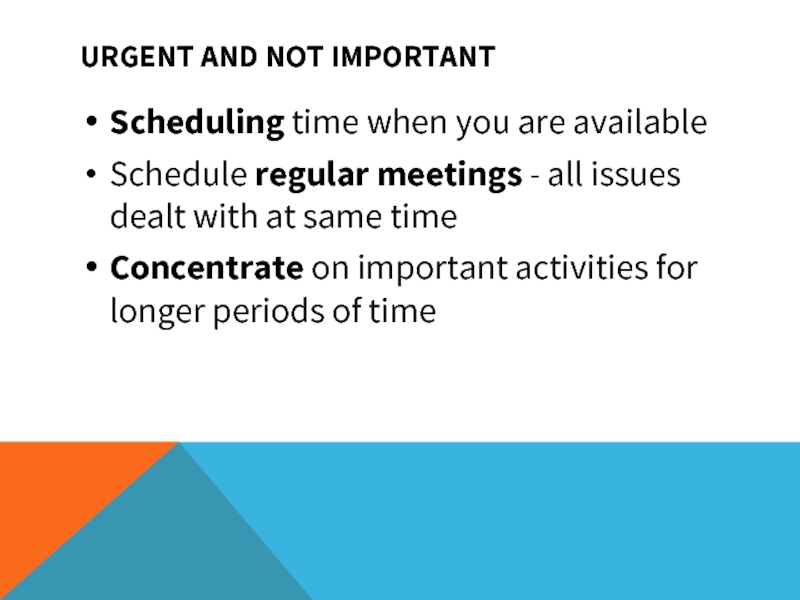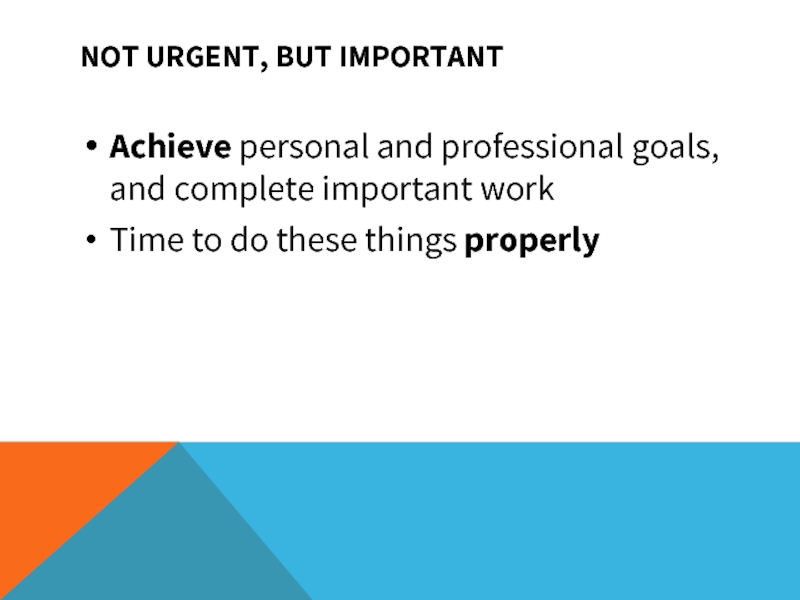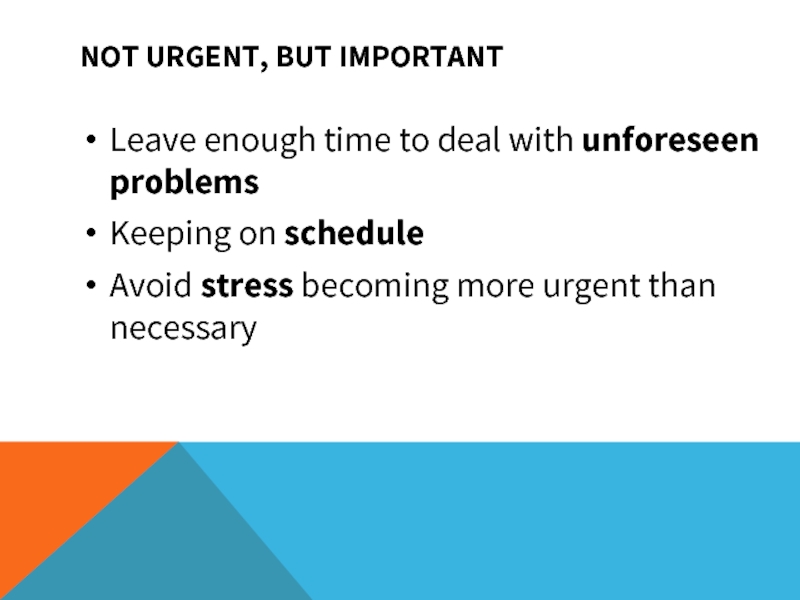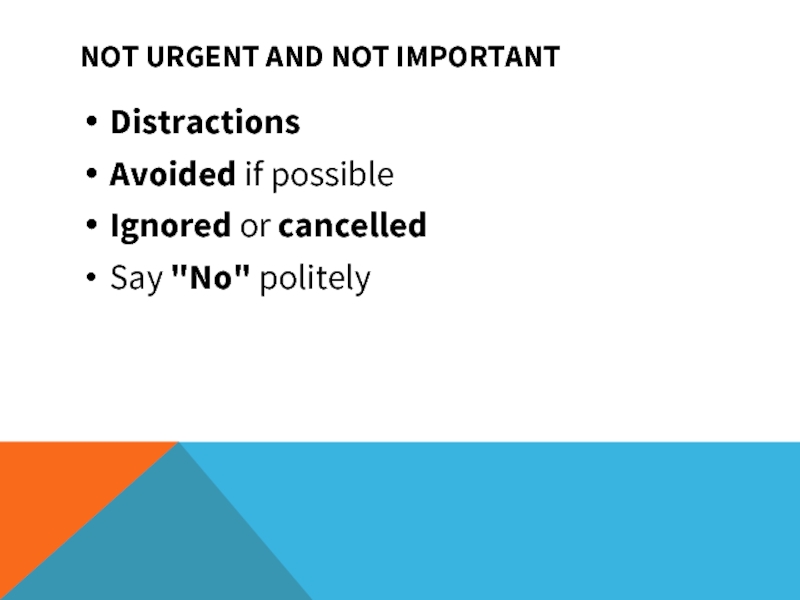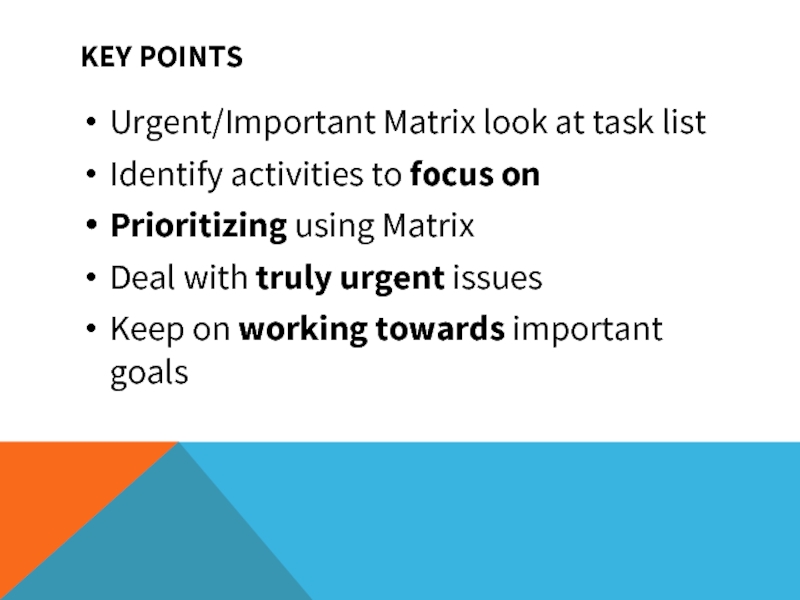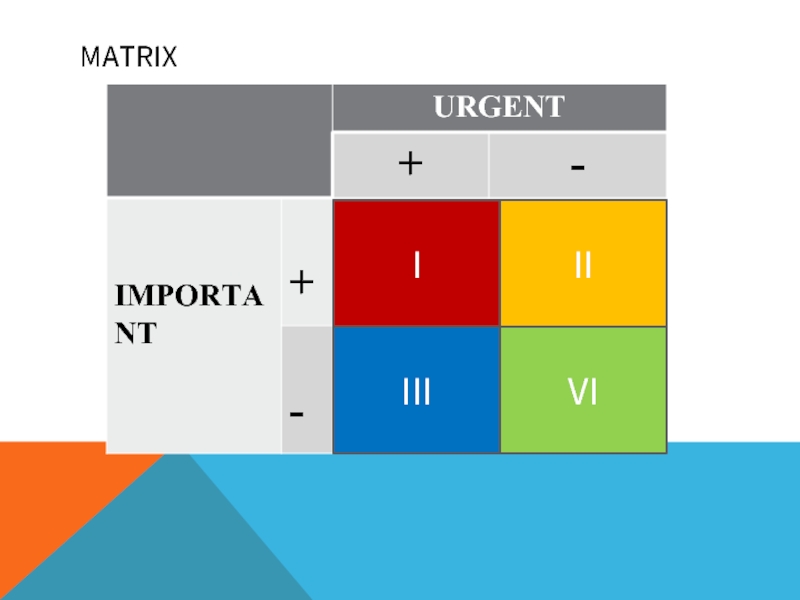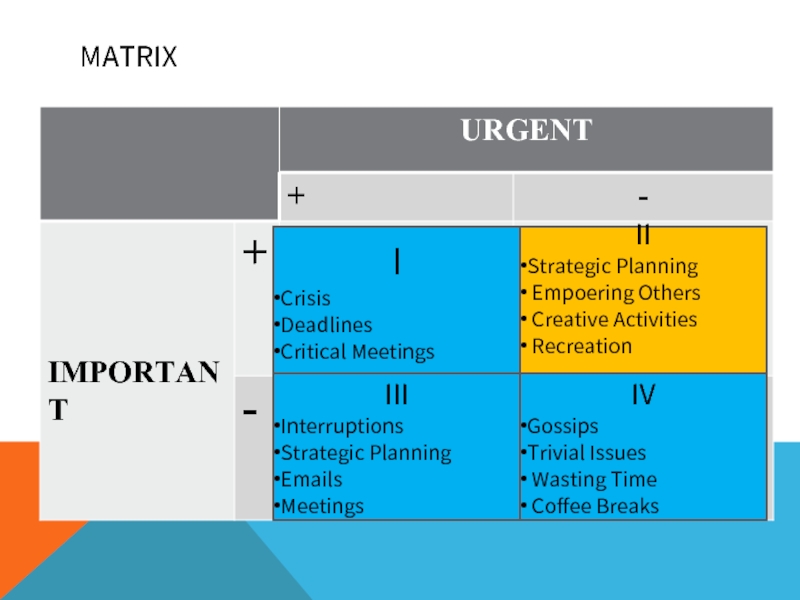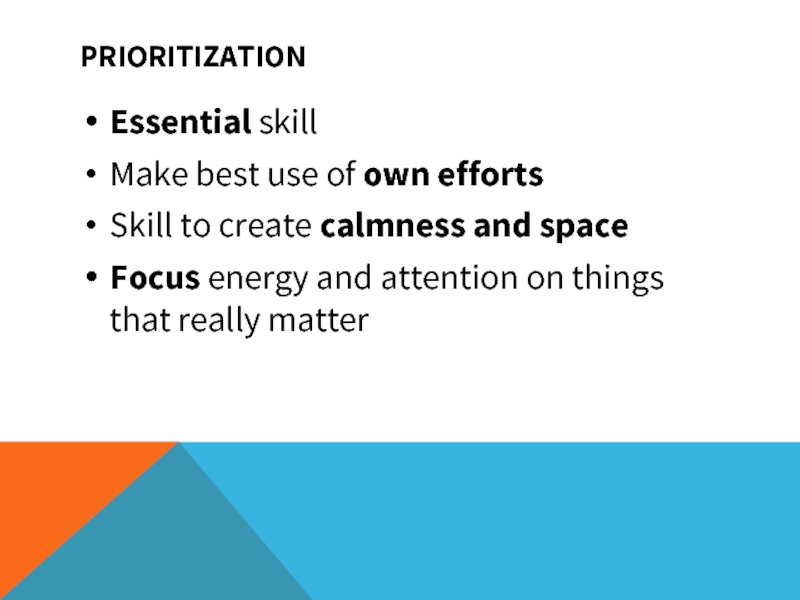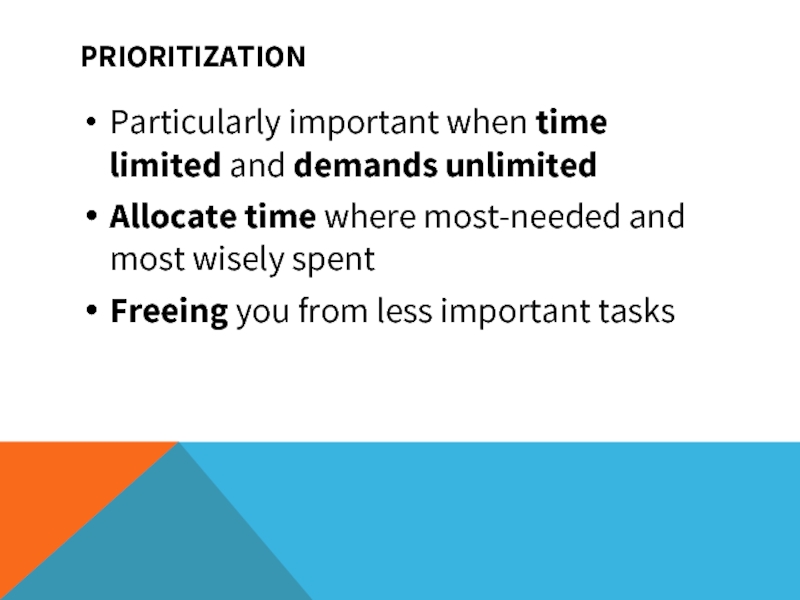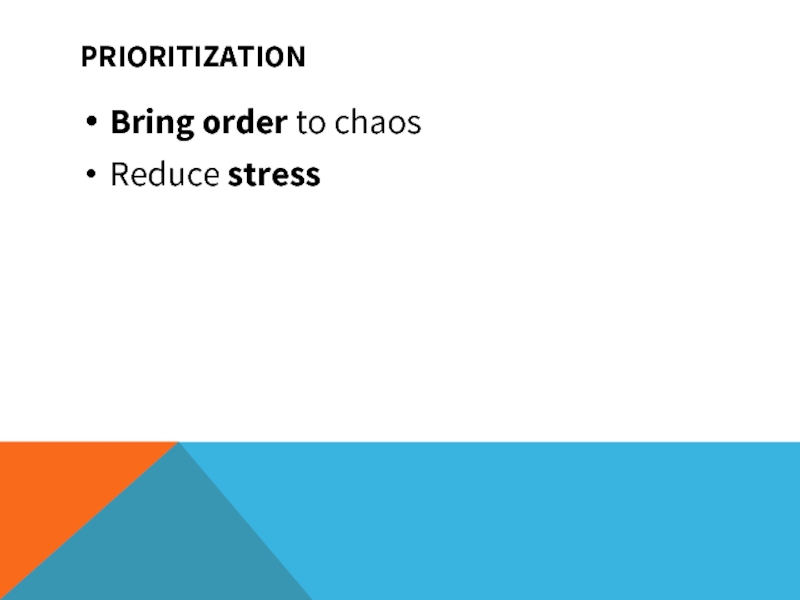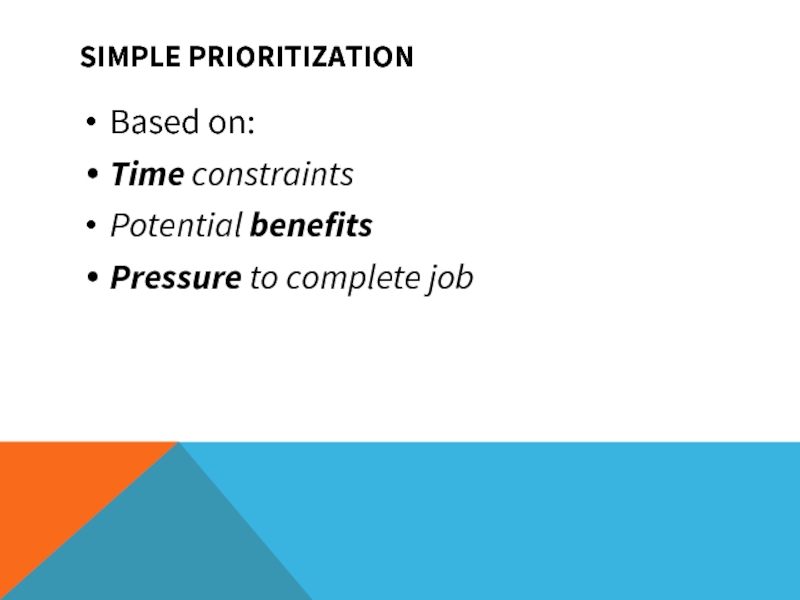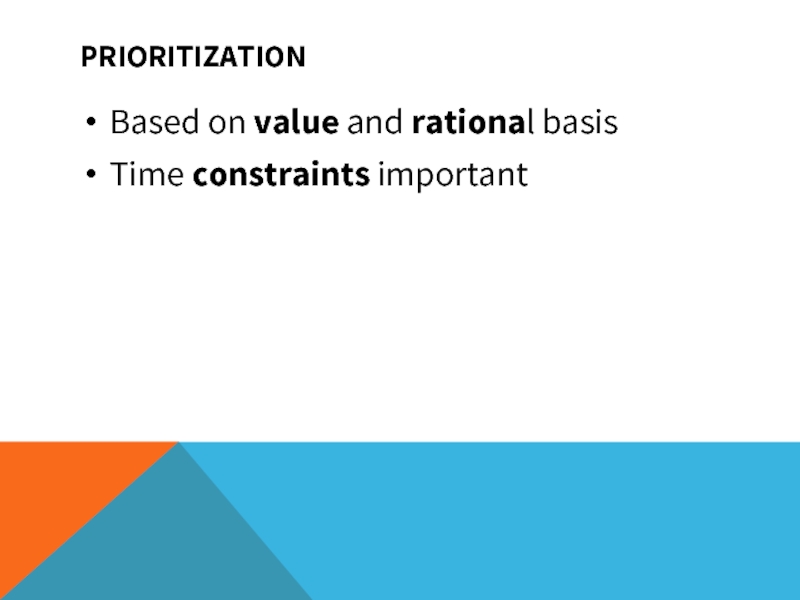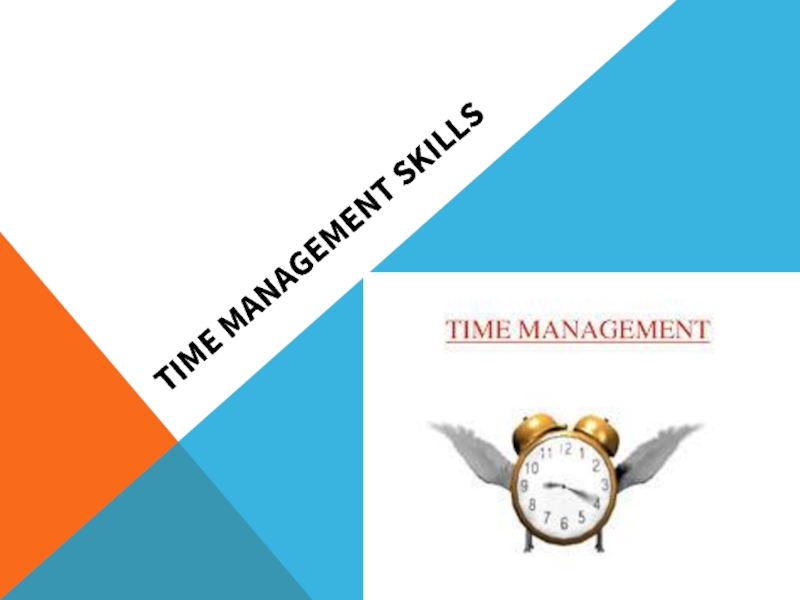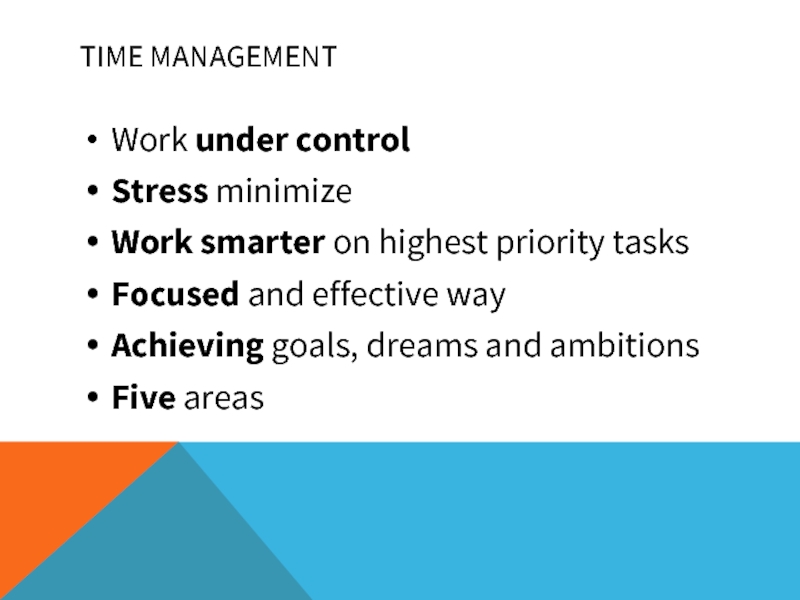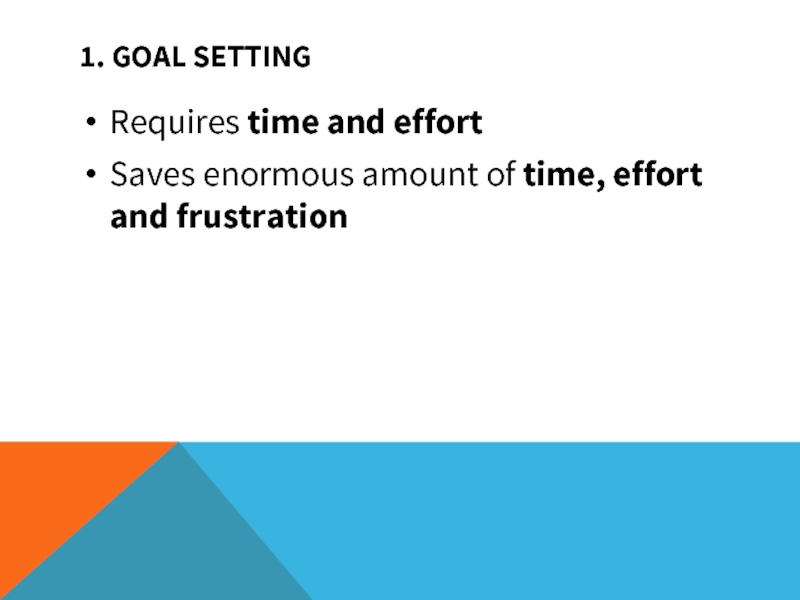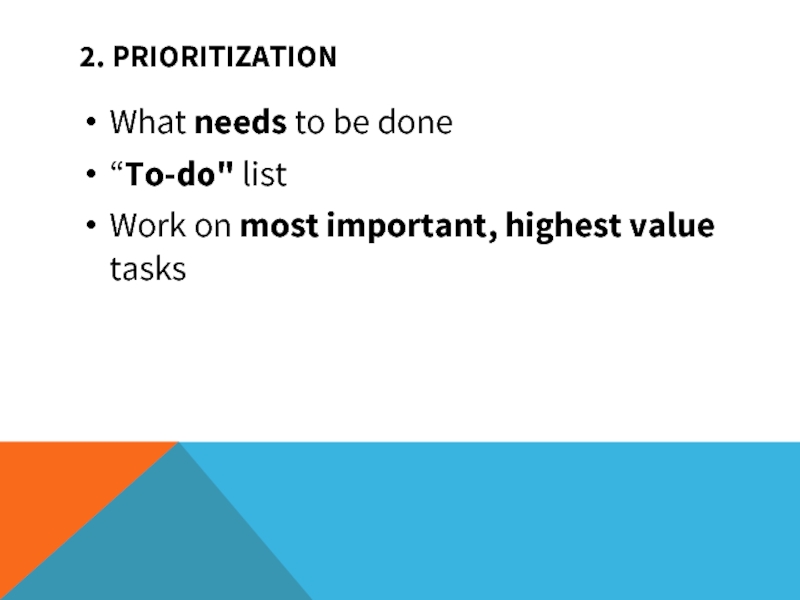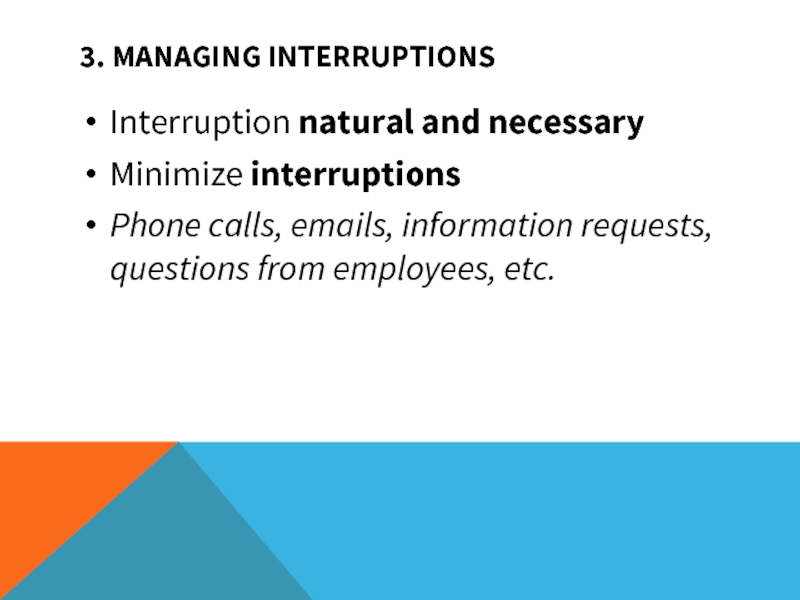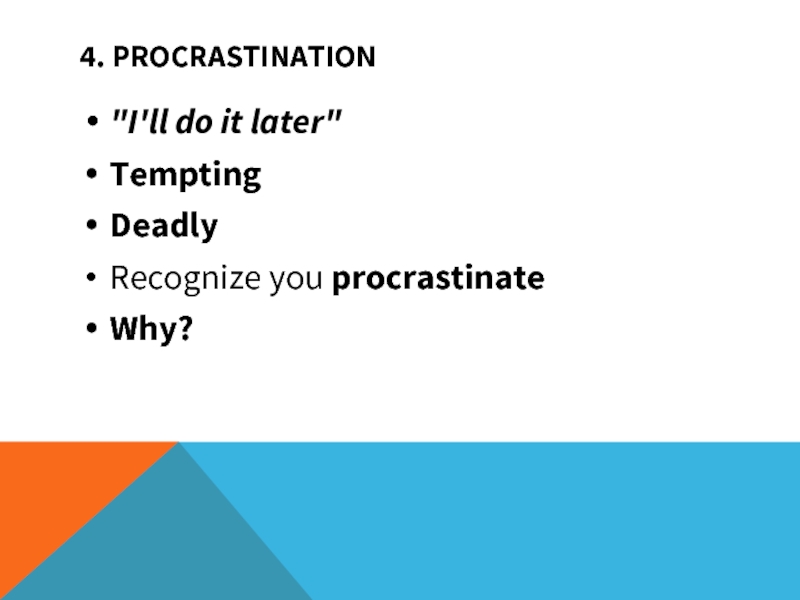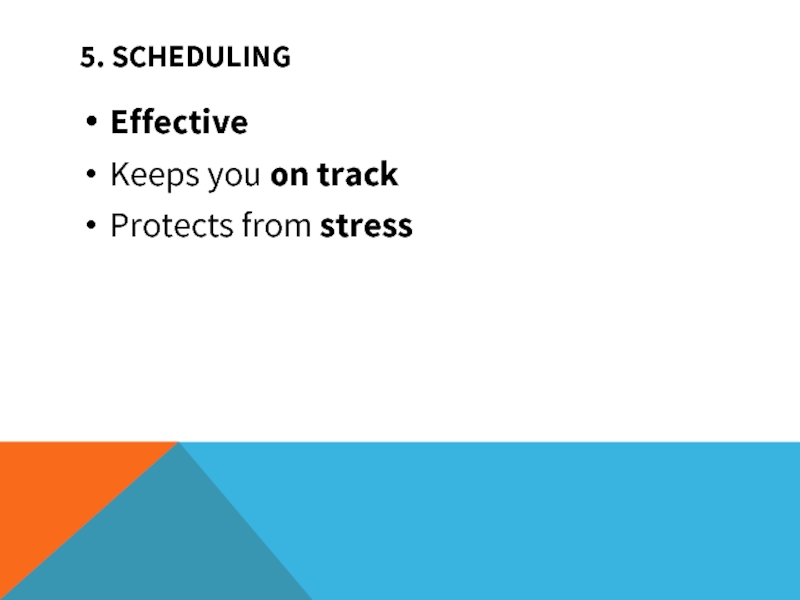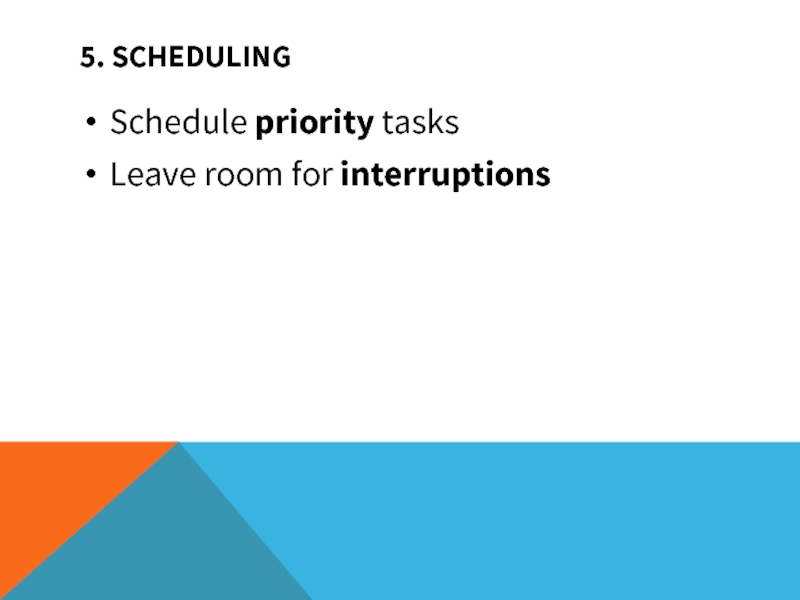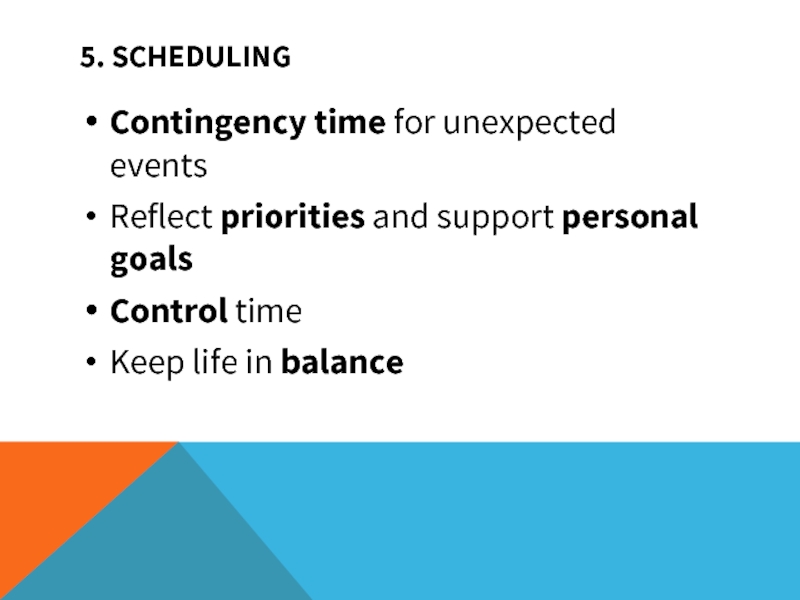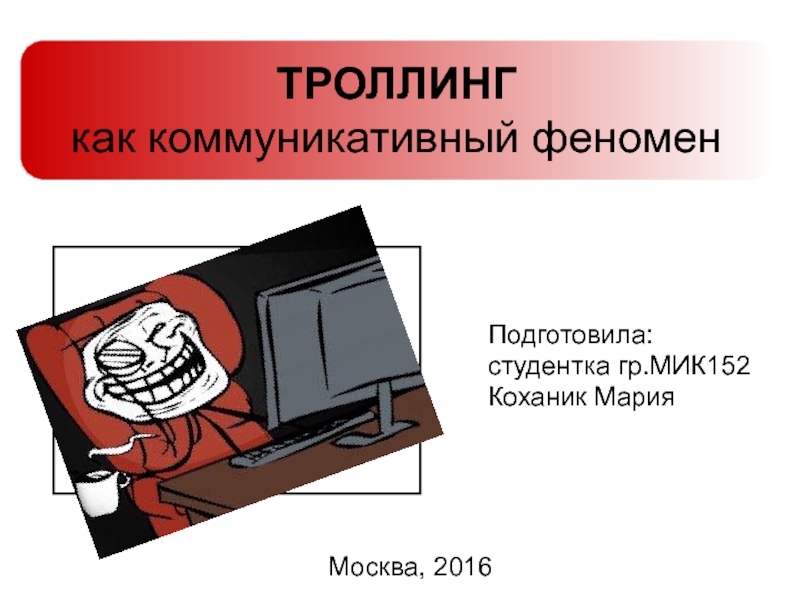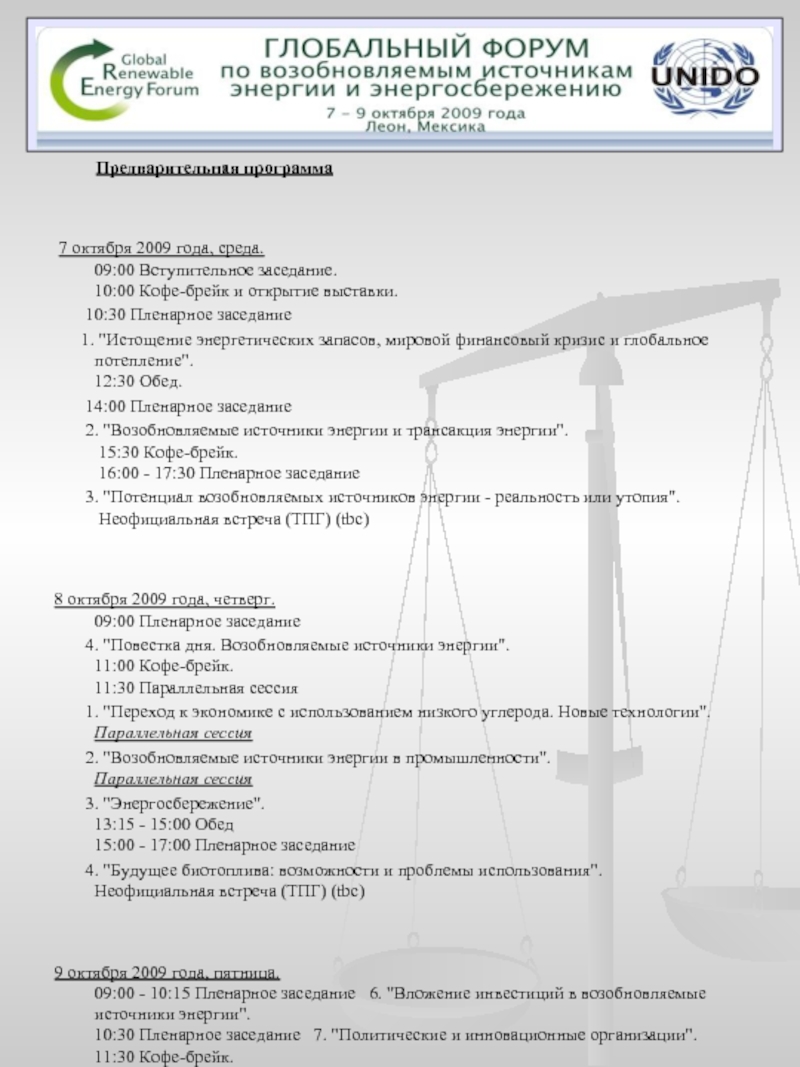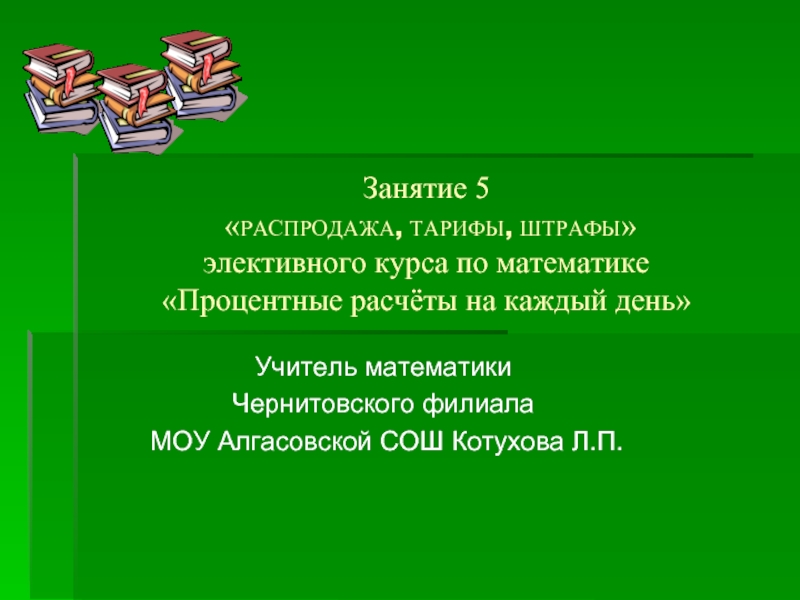- Главная
- Разное
- Дизайн
- Бизнес и предпринимательство
- Аналитика
- Образование
- Развлечения
- Красота и здоровье
- Финансы
- Государство
- Путешествия
- Спорт
- Недвижимость
- Армия
- Графика
- Культурология
- Еда и кулинария
- Лингвистика
- Английский язык
- Астрономия
- Алгебра
- Биология
- География
- Детские презентации
- Информатика
- История
- Литература
- Маркетинг
- Математика
- Медицина
- Менеджмент
- Музыка
- МХК
- Немецкий язык
- ОБЖ
- Обществознание
- Окружающий мир
- Педагогика
- Русский язык
- Технология
- Физика
- Философия
- Химия
- Шаблоны, картинки для презентаций
- Экология
- Экономика
- Юриспруденция
TIME MANAGEMENT: Using Time Effectively AND Efficiently презентация
Содержание
- 1. TIME MANAGEMENT: Using Time Effectively AND Efficiently
- 3. HEART OF TIME MANAGEMENT Shift in focus Concentrate on results Not on being busy
- 4. TIME MANAGEMENT Task yourself three questions:
- 5. TIME MANAGEMENT Common thread throughout three questions?
- 6. What Do I Do? When Do I
- 7. CHOICE Cannot manage time Manage use of time
- 8. CHOICE Making decisions about: What to do
- 9. WHAT DO I WANT TO DO? What
- 10. WHAT DO I WANT TO DO? Depends
- 11. TIME MANAGEMENT Important series of questions: How
- 12. TIME MANAGEMENT Deciding what to do comes
- 13. WHEN DO I WANT TO DO IT?
- 14. DOING IT NOW Bad habit Reacting to
- 15. WHEN DO I WANT TO DO IT?
- 16. HOW WELL DO I WANT TO DO
- 17. PARETO PRINCIPLE
- 18. 80:20 PRINCIPLE 80% of unfocussed effort generates
- 19. IMPORTANCE OF ACCURACY Quality of time
- 20. "URGENT" AND "IMPORTANT" ACTIVITIES
- 22. It's urgent But is it really important?
- 23. TIME STRESSORS Important presentation for meeting Workload
- 24. TIME STRESSORS Source of pressure and stress
- 25. URGENT/IMPORTANT MATRIX Think about priorities Determine which
- 26. GREAT TIME MANAGEMENT Effective and Efficient Spending time on things important not just urgent
- 27. DISTINCTION Important activities leads to achievement of
- 28. DISTINCTION Urgent activities demand attention Consequences of not dealing with them immediate
- 29. "What is important is seldom urgent, and what is urgent is seldom important.“
- 30. HOW TO USE THE TOOL
- 32. URGENT/IMPORTANT MATRIX Overcome natural tendency to focus
- 33. FIGURE 1 – URGENT/IMPORTANT MATRIX DISTRACTIONS INTERRUPTIONS IMPORTANT GOALS CRITICAL ACTIVITIES
- 34. STEPS List all activities to do Include
- 35. STEPS On scale of 1 to 5,
- 36. STEPS After assigning importance value to each activity Evaluate urgency
- 37. STEPS Study matrix using strategies described below to schedule priorities
- 38. STRATEGIES FOR DIFFERENT QUADRANTS OF THE MATRIX
- 40. URGENT AND IMPORTANT Two distinct types of
- 41. URGENT AND IMPORTANT Issues and crises cannot
- 42. URGENT AND IMPORTANT If lot of urgent
- 43. URGENT AND NOT IMPORTANT Stop you achieving
- 44. URGENT AND NOT IMPORTANT Interruptions from other
- 45. URGENT AND NOT IMPORTANT Scheduling time when
- 46. NOT URGENT, BUT IMPORTANT Achieve personal and
- 47. NOT URGENT, BUT IMPORTANT Leave enough time
- 48. NOT URGENT AND NOT IMPORTANT Distractions Avoided if possible Ignored or cancelled Say "No" politely
- 49. KEY POINTS Urgent/Important Matrix look at task
- 51. TIME MANGEMENT MATRIX
- 53. MATRIX I II III VI
- 54. MATRIX I Crisis Deadlines Critical Meetings II
- 55. PRIORITIZATION: MAKING BEST USE OF TIME AND RESOURCES
- 57. PRIORITIZATION Essential skill Make best use
- 58. PRIORITIZATION Particularly important when time limited and
- 59. PRIORITIZATION Bring order to chaos Reduce stress
- 60. SIMPLE PRIORITIZATION Based on: Time constraints Potential benefits Pressure to complete job
- 61. PRIORITIZATION Based on value and rational basis Time constraints important
- 62. TIME MANAGEMENT SKILLS
- 64. TIME MANAGEMENT Work under control Stress minimize
- 65. 1. GOAL SETTING Know where you're
- 66. 1. GOAL SETTING Requires time and
- 67. 2. PRIORITIZATION What needs to be done
- 68. 3. MANAGING INTERRUPTIONS Interruption natural and
- 69. 4. PROCRASTINATION "I'll do it later" Tempting Deadly Recognize you procrastinate Why?
- 70. 4. PROCRASTINATION Plan to get out of
- 71. 5. SCHEDULING Effective Keeps you on track Protects from stress
- 72. 5. SCHEDULING Schedule priority tasks Leave room for interruptions
- 73. 5. SCHEDULING Contingency time for unexpected events
- 74. Don’t Manage Time Manage Yourself!
Слайд 4TIME MANAGEMENT
Task yourself three questions:
What do I want to do?
When
do I want to do it?
How well do I want to do it?
How well do I want to do it?
Слайд 5TIME MANAGEMENT
Common thread throughout three questions?
"...do I want to do...?”
Making, organizing
and executing choices
Слайд 10WHAT DO I WANT TO DO?
Depends on three things:
Basic needs met
- for e.g., quality (and quantity) of sleep
How well to meet current commitments - how well to do what you ‘have’ to do
How much time to give to unstructured activities
How well to meet current commitments - how well to do what you ‘have’ to do
How much time to give to unstructured activities
Слайд 11TIME MANAGEMENT
Important series of questions:
How congruent tasks, actions and habits with
roles, goals, values and beliefs?
Do beliefs define roles and goals?
Do actions support them?
Do beliefs define roles and goals?
Do actions support them?
Слайд 12TIME MANAGEMENT
Deciding what to do comes from within
Do you believe in
what you’re doing?
Do you know what matters most to you?
Every role, goal, commitment, task, habit or action make more sense and have more meaning
Do you know what matters most to you?
Every role, goal, commitment, task, habit or action make more sense and have more meaning
Слайд 13WHEN DO I WANT TO DO IT?
Organizing time -- choosing when
to do something
Hard - best time to do it
Willpower and self discipline keys to delaying gratification of Doing It Now
Hard - best time to do it
Willpower and self discipline keys to delaying gratification of Doing It Now
Слайд 14DOING IT NOW
Bad habit
Reacting to things - other things pushed aside
Things
control you rather than you controlling them
Слайд 15WHEN DO I WANT TO DO IT?
Time management systems - Planners, diaries
and schedules
Work on getting better at knowing when to do it
No formula
Takes practice
Work on getting better at knowing when to do it
No formula
Takes practice
Слайд 16HOW WELL DO I WANT TO DO IT?
Decide how long and
how well you are prepared to do
Pareto Principle (80/20)
Pareto Principle (80/20)
Слайд 1880:20 PRINCIPLE
80% of unfocussed effort generates only 20% of results
Remaining 80%
of results achieved with only 20% of effort
Small proportion of activity generating big returns
Small proportion of activity generating big returns
Слайд 19IMPORTANCE OF ACCURACY
Quality of time management depends on accuracy of:
Decisions about
what to do?
Decisions about when to do things
Decisions about how to do things?
Decisions about when to do things
Decisions about how to do things?
Слайд 23TIME STRESSORS
Important presentation for meeting
Workload high
“Urgent" tasks on To-Do List
Anxious
Can't concentrate
Distracted
Слайд 24TIME STRESSORS
Source of pressure and stress
Too much to do, in
too little time
How to beat this stress?
How to beat this stress?
Слайд 25URGENT/IMPORTANT MATRIX
Think about priorities
Determine which activities important
Which are distractions
Manage time effectively
Слайд 26GREAT TIME MANAGEMENT
Effective and Efficient
Spending time on things important not just
urgent
Слайд 27DISTINCTION
Important activities leads to achievement of goals - professional or personal
Urgent
activities demand immediate attention - associated with achievement of someone else's goals
Слайд 28DISTINCTION
Urgent activities demand attention
Consequences of not dealing with them immediate
Слайд 32URGENT/IMPORTANT MATRIX
Overcome natural tendency to focus on urgent activities
Focus on what's
really important
Not “Firefighting”
Not “Firefighting”
Слайд 33FIGURE 1 – URGENT/IMPORTANT MATRIX
DISTRACTIONS
INTERRUPTIONS
IMPORTANT
GOALS
CRITICAL
ACTIVITIES
Слайд 34STEPS
List all activities to do
Include everything however unimportant
Use To-Do List or
Action Program
Слайд 35STEPS
On scale of 1 to 5, assign importance to each activity
Measure
of how important activity in helping meet goals and objectives
Do not worry about urgency
Do not worry about urgency
Слайд 40URGENT AND IMPORTANT
Two distinct types of urgent and important activities:
Could
not foresee
Left to last minute
Avoid last-minute activities by planning ahead and avoiding procrastination
Left to last minute
Avoid last-minute activities by planning ahead and avoiding procrastination
Слайд 41URGENT AND IMPORTANT
Issues and crises cannot be foreseen or avoided
Leave time
to handle unexpected issues and unplanned important activities
If major crisis arises, reschedule other events
If major crisis arises, reschedule other events
Слайд 42URGENT AND IMPORTANT
If lot of urgent and important activities
Identify which could
be foreseen
Schedule activities ahead of time, so they don't become urgent
Schedule activities ahead of time, so they don't become urgent
Слайд 43URGENT AND NOT IMPORTANT
Stop you achieving your goals
Prevent you from completing
your work
Can they be rescheduled?
Can you delegate them?
Can they be rescheduled?
Can you delegate them?
Слайд 44URGENT AND NOT IMPORTANT
Interruptions from other people
Say "No" to people politely
Encourage
them to solve problem themselves
Слайд 45URGENT AND NOT IMPORTANT
Scheduling time when you are available
Schedule regular meetings
- all issues dealt with at same time
Concentrate on important activities for longer periods of time
Concentrate on important activities for longer periods of time
Слайд 46NOT URGENT, BUT IMPORTANT
Achieve personal and professional goals, and complete important
work
Time to do these things properly
Time to do these things properly
Слайд 47NOT URGENT, BUT IMPORTANT
Leave enough time to deal with unforeseen problems
Keeping
on schedule
Avoid stress becoming more urgent than necessary
Avoid stress becoming more urgent than necessary
Слайд 48NOT URGENT AND NOT IMPORTANT
Distractions
Avoided if possible
Ignored or cancelled
Say "No" politely
Слайд 49KEY POINTS
Urgent/Important Matrix look at task list
Identify activities to focus on
Prioritizing
using Matrix
Deal with truly urgent issues
Keep on working towards important goals
Deal with truly urgent issues
Keep on working towards important goals
Слайд 54MATRIX
I
Crisis
Deadlines
Critical Meetings
II
Strategic Planning
Empoering Others
Creative Activities
Recreation
III
Interruptions
Strategic Planning
Emails
Meetings
IV
Gossips
Trivial Issues
Wasting
Time
Coffee Breaks
Coffee Breaks
Слайд 57PRIORITIZATION
Essential skill
Make best use of own efforts
Skill to create
calmness and space
Focus energy and attention on things that really matter
Focus energy and attention on things that really matter
Слайд 58PRIORITIZATION
Particularly important when time limited and demands unlimited
Allocate time where most-needed
and most wisely spent
Freeing you from less important tasks
Freeing you from less important tasks
Слайд 64TIME MANAGEMENT
Work under control
Stress minimize
Work smarter on highest priority tasks
Focused and
effective way
Achieving goals, dreams and ambitions
Five areas
Achieving goals, dreams and ambitions
Five areas
Слайд 651. GOAL SETTING
Know where you're going
What needs to be done
What
order
Without goal setting confusion or conflicting priorities
Without goal setting confusion or conflicting priorities
Слайд 661. GOAL SETTING
Requires time and effort
Saves enormous amount of time,
effort and frustration
Слайд 672. PRIORITIZATION
What needs to be done
“To-do" list
Work on most important,
highest value tasks
Слайд 683. MANAGING INTERRUPTIONS
Interruption natural and necessary
Minimize interruptions
Phone calls,
emails, information requests, questions from employees, etc.
Слайд 704. PROCRASTINATION
Plan to get out of habit
Reward yourself for getting jobs
done
Remind of horrible consequences of not doing boring tasks!
Remind of horrible consequences of not doing boring tasks!
Слайд 735. SCHEDULING
Contingency time for unexpected events
Reflect priorities and support personal
goals
Control time
Keep life in balance
Control time
Keep life in balance
